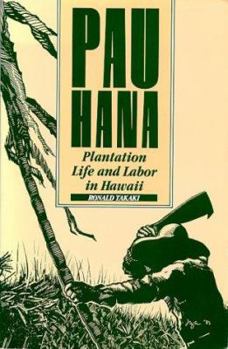Pau Hana: Plantation Life and Labor in Hawaii, 1835-1920
"A scholarly work but as readable as a novel, this is the first history of plantation life as experienced by the laborers themselves. The oppressive round-the-clock conditions under which they worked... This description may be from another edition of this product.
Format:Paperback
Language:English
ISBN:0824809564
ISBN13:9780824809560
Release Date:March 1984
Publisher:University of Hawaii Press
Length:232 Pages
Weight:0.70 lbs.
Dimensions:0.6" x 6.0" x 9.2"
Customer Reviews
2 ratings
Pau Hana
Published by Thriftbooks.com User , 18 years ago
In many ways it was the plantation labor experience that makes Hawaii unique in the world. Sugar plantations were very labor-intensive operations and workers were needed wherever they could be obtained. Management couldn't mistreat the plantation workers because the workers were so essential. But as plantation labor matured, they began to assert more demands for higher wages and better treatment. Takaki tries to be fair to all sides in the "contested territory" of the plantation. There is a myth in Hawaii that local Hawaiians were unsuited to plantation labor -- depending on your prejudices, Hawaiians were either too lazy or too smart to work so hard. Takaki observes that the indigenous labor structure of Hawaii wasn't any less exploitative than the plantation system, and native Hawaiians did work on the plantations, sometimes as lunas (field bosses). Problem was, the labor needs of the plantations exceeded the ability of the local population to supply, especially after the calamitous die-off of locals from imported diseases. I wish Takaki had not stopped at 1920. The history of plantation labor from then until it finally disappeared in the 1960s and 70s could be another book. The unhappy irony of the Hawaiian plantation system is that once the planters provided humane wages and living conditions the Hawaiian plantations could no longer compete with cheap-labor producers elsewhere in the world where workers are treated more poorly. Takaki's book helps explain why the word "Hawaiian" today can apply to a person of a dozen ethnic backgrounds, or a blend of any combination of them, including ethnic Hawaiian.
Excellent book on the life of the different ethnic groups.
Published by Thriftbooks.com User , 25 years ago
This book revives memories of times gone by. It covers a period of laborers working in the sugar plantations of Hawaii. A diverse group of people, coming together under hardships, overcoming adversity and language barriers. Mr. Takaki did an excellent combination of relating the days that made sugar King, and how it was built on the backs of the Portuguese, Japanese, Chinese, Filipino's. Today's descendents can read this book, smile, weep, and relate from stories told to them as children by these hardy laborers.





